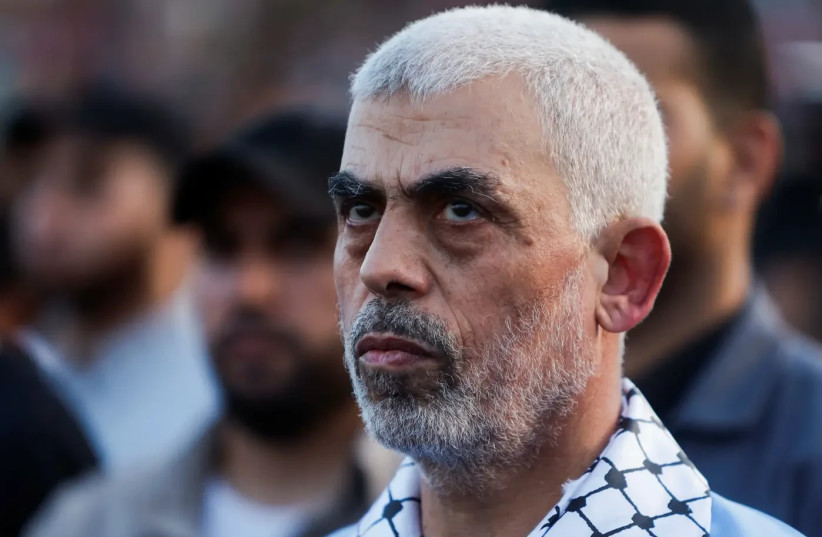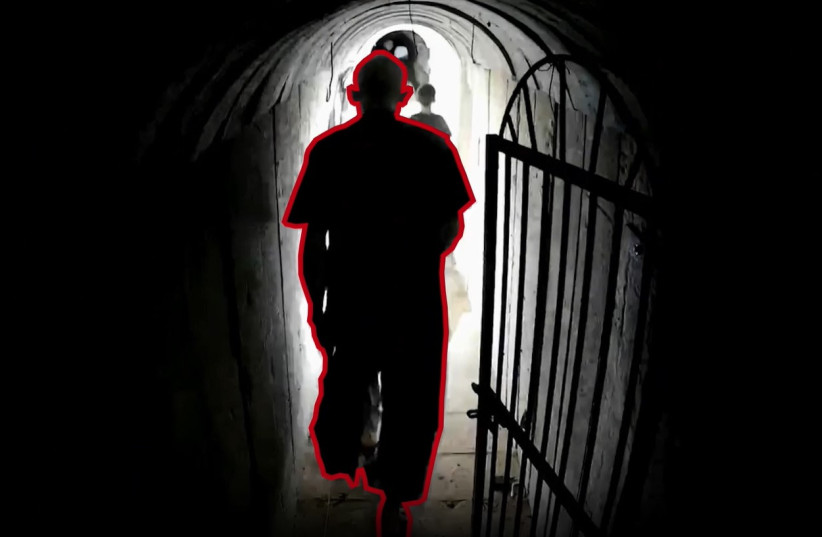Defense Minister Yoav Gallant’s public boasts that Hamas Gaza leader Yahya Sinwar’s days as the leader of the movement were limited, were a bit exaggerated. But there may be a more important point of optimism to be gleaned from Sinwar’s actions.
After nearly four months of top Israeli defense officials admitting they did not know the answer to an all-important question: it seems likely that Sinwar does want to live, rather than die a martyr.
This does not mean that the Israeli hostages still alive will be returned; there are many obstacles and things could go awry. But it may be the most significant hopeful moment to get them back and end the conflict since Israel took operational control over northern Gaza, but with nothing to show for it in the elimination of Hamas leaders.
But before explaining why, Gallant’s statements need to be examined along with Israeli intelligence and past Israeli developments with Sinwar.
Some believed that his gamble of launching a mega massacre against Israel on October 7 showed that he had become messianic, had a death wish, and was willing to risk his regime just to draw blood. In this narrative, he sought to die in glory, rather than maintain his indefinite control over Gaza, however held back by Israeli power his rule was.

Are attempts to negotiate with Sinwar worth it?
Instead of accepting exile in Qatar at that point in exchange for the return of the hostages, sparing Khan Yunis from an intense and destructive invasion, Sinwar again seemed undeterred that more of Gaza would become a graveyard.
IDF generals throughout Gaza became doubtful that Sinwar could be negotiated with. The Jewish state might need to choose between the hostages’ return and Sinwar in power, or eliminating Sinwar and losing many hostages.
The hopeful theory at that point was that Sinwar was holding out until the IDF was “knocking on his door,” and that, once cornered, he would give up the hostages for expulsion to Qatar.
But Sinwar’s willingness to launch the attack on October 7 and to let Gaza burn over and over again placed all of this in doubt.
That was until Gallant’s comments on Sunday.
Sinwar is no longer easily reachable by Hamas’s leadership abroad.
One of the reasons there is no hostage deal yet is that Hamas is still demanding to retain its rule in Gaza. Another reason is that no one in Hamas can locate Sinwar to get his approval of a deal and his commitment to produce the hostages. He has not been giving military orders for some time.

IT HAPPENED IN southern Lebanon after less than two decades. And that means at some later point, whoever might turn on Sinwar could face retaliation.
So Hamas’s outside leaders are trying to find someone to speak to in Gaza who can produce hostages and help them contact Sinwar or get a sense of what Hamas military assets remain.
Hamas in Gaza is not done with Sinwar, but is seeking an interim strategy until a more opportune moment for greater collective military action presents itself.
This puts Israel and Hamas at a transition point but not a final tipping or endpoint.
As long as he holds the hostages, Sinwar remains powerful and relevant, even if others are cutting into many aspects of his power.
Then why the optimism?
Because he continues to run even as large aspects of his power are crumbling.
It was one thing to let northern Gaza and even Khan Yunis burn.
Until this week, Israel was offering him expulsion to Qatar in exchange for the hostages, while ministers Benny Gantz, Gadi Eisenkot, much of the media, and the powerful hostages’ families lobby were pressing Netanyahu even to leave Sinwar in power in exchange for the hostages.
Until this week, staying hidden and fleeing repeatedly could still be seen to advance his goal of holding Gaza and achieving a mass release of Palestinian prisoners.
The sea change is that now Sinwar is allowing significant aspects of his rule to fall apart – and is still fleeing. If his goal was to win glory, maintain his rule, and prepare to die, this would be the point to stop running.
He could try to call Israel’s bluff, by revealing his hideout but keeping hostages so close that Israel would not dare attack him.
The fact that he is choosing to flee even as his power erodes, suggests he is worried that if Israel finds him, he may not survive even with the hostages shielding him.
Therefore, if this assessment is correct, is true, once Israel does catch him, he may be willing to release all hostages in exchange for expulsion.
And if Israel knows that and can get closer to him, then Jerusalem may finally have a way to bring an end to the main aspect of the conflict.
